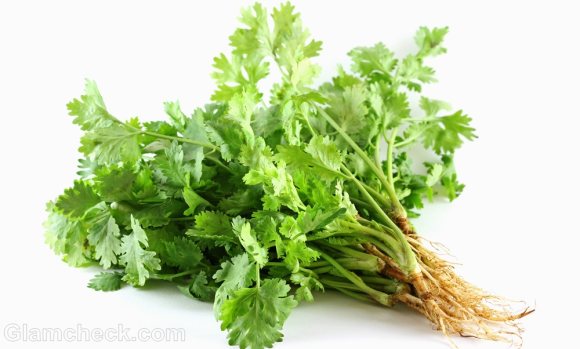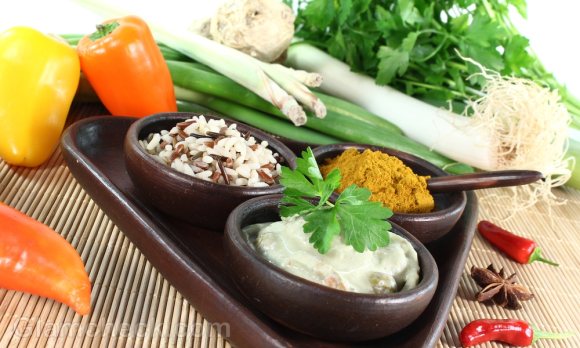When talking about coriander, people mostly refer to the seeds that are used as spices for flavoring food. But for the purpose of the health benefits of coriander, this article will refer to coriander in all its forms – coriander seeds, the coriander plant (better known as cilantro), coriander oil, coriander juice, and coriander powder.
 Latin name Coriandrum sativum, coriander is actually a herb. The health benefits of coriander are made possible because of the multitude of nutrients in this humble little plant. Coriander contains iron, magnesium, thiamine, dietary fibers, flavonoids, phytonutrients, vitamin A, vitamin B6, vitmain C, vitamin E, vitamin K, zinc, potassium, phosphorous, selenium, manganese, riboflavin, copper, and calcium – to name just a few! Coriander is very low in calories, just 23 per 100 gm. And yet, just 100 gm packs a wallop of health benefits that you would never imagine.
Latin name Coriandrum sativum, coriander is actually a herb. The health benefits of coriander are made possible because of the multitude of nutrients in this humble little plant. Coriander contains iron, magnesium, thiamine, dietary fibers, flavonoids, phytonutrients, vitamin A, vitamin B6, vitmain C, vitamin E, vitamin K, zinc, potassium, phosphorous, selenium, manganese, riboflavin, copper, and calcium – to name just a few! Coriander is very low in calories, just 23 per 100 gm. And yet, just 100 gm packs a wallop of health benefits that you would never imagine.
Coriander is used to make some beers, in pickles since its antioxidant content prevents food from spoiling, and it is an important ingredient in curry. But discovering the health benefits of coriander have made people start using coriander in a variety of ways even in traditional dishes that do not call for coriander as an ingredient, as well as using coriander in poultices, healing tonics and face packs for beauty treatments. Coriander is a common herb that is available all over the world. So you can take advantage of the health benefits of coriander no matter where you are. Let’s take a closer look at the health benefits of coriander that make it a must-have ingredient in any kitchen.
Amazing Health Benefits of Coriander
 Before you start taking coriander or indeed any food for its health benefits, you should consult with a qualified healthcare professional, especially if you are suffering from a disease. This could be your doctor, a naturopath, an Ayurvedic practitioner, or a herbalist. However, for now here are some of the most widely known health benefits of coriander that have been researched and are backed by science.
Before you start taking coriander or indeed any food for its health benefits, you should consult with a qualified healthcare professional, especially if you are suffering from a disease. This could be your doctor, a naturopath, an Ayurvedic practitioner, or a herbalist. However, for now here are some of the most widely known health benefits of coriander that have been researched and are backed by science.
Aids in Digestion
Ayurveda promotes coriander in a healthy diet not just for its other health benefits but mainly because of coriander’s effects on the digestive system.
- Coriander actually makes your stomach much stronger, so you will easily be able to digest even heavy meals if you take coriander on a regular basis. The dietary fibers in coriander are what make this a wonderful digestive aid.
- Dry coriander can help to cure diarrhea.
- Coriander juice is used to treat dysentery and nausea. You can add a couple of spoons of coriander juice to a glass of buttermilk to help alleviate the symptoms of dysentery and to reduce the severity of nausea.
- Coriander can also help to prevent or get rid of intestinal gas. Simply boil some coriander seeds in water and drink the resulting concoction after straining. But make sure to leave it for ten minutes first so that the coriander has a chance to be properly infused.
Health Benefits of Coriander for Diabetics
The results of a study which was released in January 2011 proves conclusively that one of the health benefits of coriander is that it can lower blood sugar as well as regulate insulin levels. Coriander also protects the kidneys and the pancreas, both of which are overly stressed in diabetics. So if you are trying to control your blood sugar or looking for natural ways to treat your diabetes, include some coriander in your diet on a daily basis.
Another way that coriander benefits diabetics is by lowering LDL or bad cholesterol. This actually helps to protect the heart, which is extra vulnerable in diabetes patients. Coriander included in a healthy diet can help to raise the levels of good cholesterol too.
Coriander Health Benefits for the Eyes
The abundance of essential oils, minerals and vitamins in coriander make it very good for the eyes. Coriander can help to counter the effects of aging on the eyes. The health benefits of coriander for the eyes go so far as to prevent macular degeneration – an ocular disease that may lead to blindness. Coriander also helps to de-stress tired eyes. You can use coriander juice to alleviate dry eye or irritation caused by dust and pollution.
Powerful Against Harmful Bacteria
Some infections are resistant to antibiotics. These are the most difficult to fight off as no amount of medication can get rid of them, and they usually get even stronger when attempts are made to treat them with antibiotics. A study on coriander conducted in Portugal uncovered that coriander causes damage to such bacteria. In fact, even deadly bacteria such as salmonella react very badly to coriander. So eat your coriander if you want to keep the bad bacteria at bay. Coriander can also help in the prevention of urinary tract infections. Since fevers too are caused due to infection of some kind, having some coriander can cool the system and help the fever to break.
Prevention of Cancer
Coriander leaves have more antioxidants than coriander in its other forms. If you have ever read up about cancer, you already know that antioxidants are especially good at keeping cancer at bay and helping cancer patients to recover. A study showed that coriander may be able to prevent cancer. So far, only animal testing has been done on the subject, and the protective benefits of coriander were seen in regard to colon cancer. Further human testing still needs to be done to confirm if it will prevent colon cancer in humans as well, but it is reasonable to assume that a food as high in antioxidants as coriander will be beneficial in some way in fighting cancer.
Has Anti-Inflammatory Properties
Coriander’s natural anti-inflammatory properties help reduce the severity of joint pain in arthritis patients. But a very recent study claims that this health benefit of coriander may extend to more than just treating arthritis. According to the findings, coriander’s natural anti-inflammatory properties can protect the nervous system from damage caused by neurodegenerative diseases. So disorders of the nervous system may be treated with coriander.
Coriander Health Benefits for Skin
Apply a paste of coriander powder or coriander juice and turmeric to reduce pimples and blackheads. But that’s not all. Coriander has anti-bacterial properties as we have seen earlier. It is also an effective anti-septic and a disinfectant. It has amazing detoxifying and anti-fungal properties that make it an effective natural medicine for the treatment of dry skin, mouth ulcers, eczema and other skin disorders. In fact, the health benefits of coriander for the skin are powerful enough to prevent and perhaps even cure small pox. The itching brought on by smallpox can be greatly soothed with coriander both when applied topically and when taken in food.
Other Health Benefits of Coriander
- Chew on some coriander seeds to get rid of bad breath. Had a plateful of onion rings or a very garlic-y dish? Coriander will help to reduce the rancid breath that you are sure to be left with.
- Traditional medicine and alternative therapies say that coriander juice or coriander tea can help women who have heavy periods or severe pain during periods. This may be because coriander stimulates the endocrine gland to secrete a balance of hormones that can promote normal periods with minimal cramping and discomfort.
- If you are retaining water or if you have a lot of phlegm in your system after a particularly nasty bout of the sniffles, then you have one goal in mind – getting it out. Coriander acts as a natural diuretic so it will help your body to discharge urine. The same properties that allow this also make coriander great for getting all that mucous-y phlegm out.
- The high iron content in coriander makes it an excellent food for anemic patients.
- Since coriander is considered an appetite stimulant, it is sometimes used in the treatment of anorexia.
- There is no scientific evidence to support the sexual health benefits of coriander, but coriander has long been thought to increase libido and act as a natural aphrodisiac. No harm in trying it out, right?
- Coriander may help to stop a nose bleed.
How to Get the Health Benefits of Coriander
 There is no dearth of ways in which you can incorporate coriander into your diet. Following are just a few ways in which you can get the health benefits of coriander. If you are creative in the kitchen, you may discover some other ideas as well, in which case do not forget to share. But for now, here are a few tips to help you get started on gaining the health benefits of coriander.
There is no dearth of ways in which you can incorporate coriander into your diet. Following are just a few ways in which you can get the health benefits of coriander. If you are creative in the kitchen, you may discover some other ideas as well, in which case do not forget to share. But for now, here are a few tips to help you get started on gaining the health benefits of coriander.
- Chopped coriander leaves can be used as garnish on salad, rice, gravy, or any other food. It will give you the health benefits of coriander as well as add unique flavor to your dishes. Plus, the bright green of the coriander makes the food more visually appealing.
- You can get the health benefits of coriander by brewing some coriander powder/coriander seeds/ chopped coriander leaves in hot water to make coriander tea. Coriander is one of the ingredients used to make an after-meal digestive Ayurvedic tea; other ingredients in this digestive include ginger or ginger powder, fennel, and cardamom. But even without these extra spices, drinking plain coriander tea will give you plenty of health benefits.
- Coriander is frequently used in cooking. Roast some coriander seeds in a little oil before adding them to vegetable or meat dishes. They will impart a smoky flavor that teases the palate, and also gives you the health benefits of coriander. You can find many more cooking tips for coriander or recipes that include coriander in Mediterranean, Thai and Indian cuisine.
- Coriander powder can be used in any dish that calls for coriander and you cannot get fresh coriander. Yes, the flavor will be different, but you will still be getting the health benefits of coriander.
- Add a spoonful of fresh coriander to lentil soup, clear soup, or tomato soup. You can add to several other soups as well if you grow to like the flavor.
- Cooking in coriander oil is also very beneficial to health.
- Put some fresh coriander in a blender with mangoes or bananas, strawberries or blackberries to make a nutrient-rich smoothie that tastes great, satisfies the sweet craving and gives you the health benefits or coriander.
Coriander leaves go bad very quickly. Drying them does not help much. Neither does refrigeration. But to keep those tender greens fresh and flavorful for longer than a week, freeze them instead.
Try growing your own coriander. You do not need much space – a small box on a window sill will do. This way, at least you can be assured of always having some fresh coriander at hand, plus you can be sure that it is organic this giving you the health benefits of coriander without having to suffer the side effects of pesticides, GMOs, and growth aids.
Counter-indications of Coriander
DO NOT take coriander for its health benefits in your pregnancy first trimester. If you have noticed, coriander does a good job of expelling stuff from the body. It’s a great diuretic, it works for constipation and indigestion, helps in the expectoration of cough. There is thus a worry among health care practitioners that the very same properties that allow coriander to be so effective at these tasks may cause the baby to be expelled as well in the first few weeks when the pregnancy is at its most vulnerable stage. There is no research to support this, but better safe than sorry. Having coriander in your meals once in awhile is fine. But do not have too much of it or include it in your diet everyday as you would if you were trying to get the health benefits of coriander. You will have plenty of time for that after you are in the safe zone of your pregnancy.
Coriander is also not recommended for children below the age of two.
Taken in very large amounts, coriander can make you feel drowsy. It is not known why. But with any balanced diet, moderation is the key. So as long as you do not overdo it, you should be fine.
As always, you should get tested for coriander allergies before you start taking coriander on a regular basis. Coriander is not an allergic food, but there have been a few cases of food allergies being triggered by coriander. Just make sure you’re not one of them.
Image: Shutterstock
